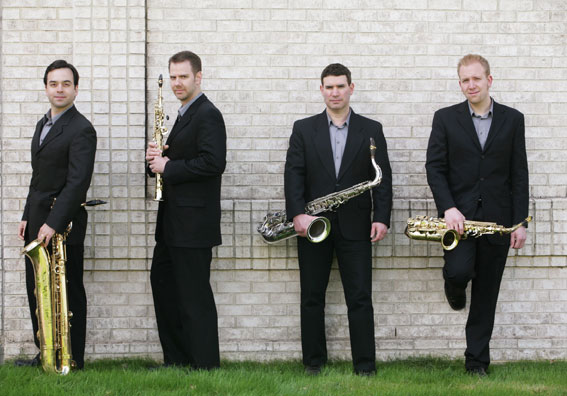PRISM sax quartet traverses musical genres with artistry
Audiences still occasionally titter with surprise, and some discomfort, when they see a saxophone on the concert stage, even when Ravel’s Bolero is on the program.
The saxophone is indelibly identified with jazz, even though the instrument predates the music by something like seventy years. Classical music audiences see it as exotic, even vulgar, and that may explain why the PRISM saxophone quartet, celebrating their thirtieth year in this bicentennial of Adolphe Sax, have little of the notoriety of the Kronos Quartet.
Like Kronos, PRISM has been playing music at the edge where the classical tradition meets new, jazz, experimental, and world musics. Like Kronos, PRISM has, by commissioning new compositions (currently over 200), birthed a substantial amount of music by composers and musicians from numerous genres. This year, they have already released two recordings on Innova: The Singing Gobi Desert, a collection of pieces by Bright Sheng, Lei Liang, Fang Man, and Huang Ruo that pair the quartet with Chinese instruments; and People’s Emergency Center, with music composed by quartet founder and resident composer, tenor saxophonist Matthew Levy. On that recording the group is joined by jazz musicians likes pianist Jason Moran, guitarist Ben Monder, and alto saxophonist Rudresh Mahanthappa.
PRISM has brought more outstanding musicians to the stage this year as part of a project they call Heritage/Evolution. PRISM commissioned new pieces from six jazz saxophonists and has played the music with them in three concerts at Symphony Space, the final one heard Thursday night. After dazzling younger players Mahanthappa, Steve Lehman, Miguel Zenón, and Tim Ries, this last concert featured veteran greats David Liebman and Greg Osby. This was the most purely pleasurable concert of the series.
Though not a jazz concert, Liebman and Osby improvised plenty, as did PRISM—Levy, Timothy McAllister playing soprano and alto saxophones, alto saxophonist Zachary Shemon and baritone saxophonist Taimur Sullivan. Liebman and Osby’s world premieres were substantial statements, and the contrast between their jazz phrasing and the more classical style and sound of PRISM revealed ideas and colors that commingled with deep sympathy.
In contrast, the four sections of Jennifer Higdon’s Short Stories that opened the concert had the sound of a composer exploring an instrument with which she wasn’t entirely simpatico. Higdon was previously a composer-in-residence with the group, and some of the writing—particularly the cascading cartoon music of “Chase” and the sustained lyricism of “Lullaby”—showed an appreciation for the fluid intervals and rich sound that are a natural to the horn. But the piece emerged largely as a set of studied technical exercises with little room for musicality.
The rest of the saxophone music brought out the best in the instrument and in the players. Levy’s Serial Mood: Reflection came next, with Liebman and Osby on stage. The musicians were playing music that demanded they listen to each other, to blend sonorities and tune rich harmonies.
PRISM’s intonation is of the highest order, and the combination of their precision and warm, round tone meant that the chords they made together were astonishingly beautiful. Liebman and Osby improvised brilliantly over these, both extremely fluid, the former intense and spiritual, the latter elegant and thoughtful.
Levy’s piece is an unusual combination of atonal and modal harmonies with a subtle structure—just as they seem about to drift away into obdurate abstraction, they tease out the thread of a tonal direction. Liebman and Osby circled around and built off the chords, before the tempo picked up and the piece turned into a contemporary take on big band music.
Osby wrote his Covenant of Voices out of his fascination with the sound of the Bulgarian Women’s Choir. Although he doesn’t explore the microtonal dissonances that give that group its distinctive sound, he does work extensively with harmony. In an post-concert discussion, Osby described how he revised the piece over and over before handing it to the musicians Monday, and that set the polish of the sound and performance into greater relief.
Covenant of Voices was gorgeous. Osby’s writing combines the virtues of horizontal counterpoint and vertical structures, and the mellifluous, sonorous sound of the quartet was mesmerizing and sensuous. The solos from the two jazzers added rich, natural extensions to the harmonies.
What identified Osby’s and Liebman’s pieces as the work of jazz musicians was the diffuse large-scale form, the feeling that the moment-to-moment elements never completely revealed a clear, overall shape and direction. Liebman admitted that “fifteen minutes of written music, that’s scary for us [jazz] guys!” But the sound of the moments was beautiful and expressive, and that was the point and purpose of the music making.
Liebman brought a handful of short pieces along with his commission, Trajectory. Again, he and Osby had space for solo statements, but Trajectory was primarily made for the PRISM players to explore non-jazz, structured improvisation on their own, and was a satisfying opportunity hear the breadth of the group’s musicianship and their individual, creative approach to improvisation.
Liebman also had arrangements of a track—made by his wife Caris Visenitn—from his classic solo album, The Loneliness of the Long Distance Runner; of his punchy tune “A Moody Time”; and a lovely transcription and arrangement of John Coltrane’s “Dear Lord.” These were alternately lyrical and exciting workouts for the musicians. “Dear Lord” was especially finely crafted: Liebman’s extension of the melodic line and his reconstruction of the harmonies in long tones was a lesson in imaginative thinking and sound painting.







Posted Jun 13, 2014 at 5:59 pm by S. Munzer
A nice review. Sounds like you all had a blast performing.
PRISM is an awesome sax quartet.
Posted Sep 11, 2014 at 11:40 am by carmela delmastro
I wanted to buy tickets for this show during parent’s weekend but can’t find where to purchase them. Are they free?